Gardening is a rewarding and gratifying activity for many, but when it comes to applying neem oil, not all plants are compatible. Unknowingly using neem oil on certain plants can damage and even kill them, making it important to know what plants to avoid when considering the use of this natural insecticide. Discover here which plants should not get neem oil treatment so you can enjoy a happy and healthy garden!
What is Neem Oil?
Neem oil is a natural pesticide made from the seeds of neem trees. It has been used for thousands of years in India and other parts of Southeast Asia to protect crops, gardens, and livestock from pests. Neem oil works by disrupting the growth cycle of insects, preventing them from feeding and reproducing. It also has fungicidal properties which help to prevent fungal diseases. Additionally, it can be used as an organic fertilizer due to its high nitrogen content.
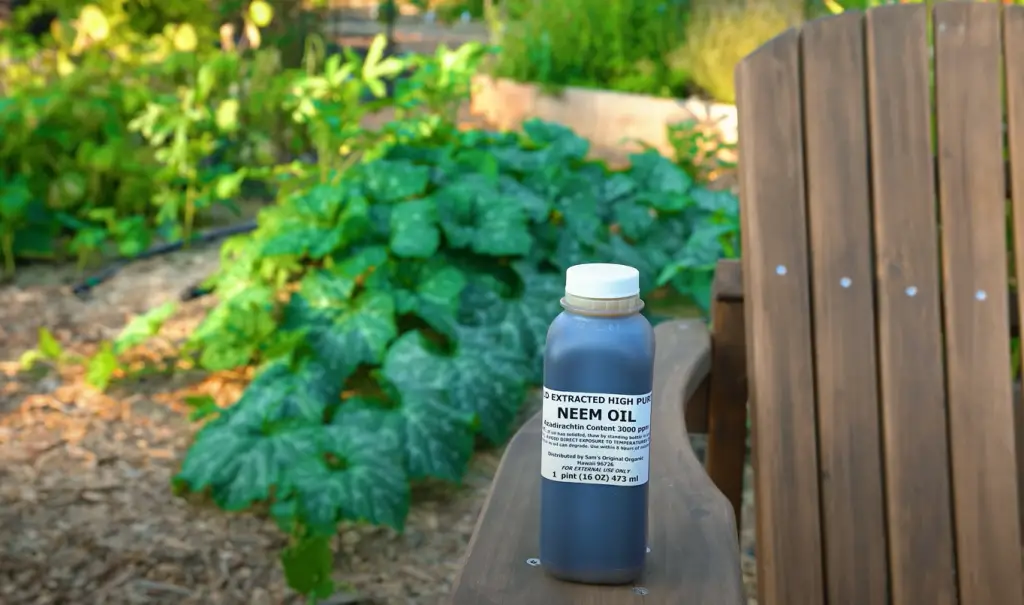
Neem oil is highly effective against a variety of bugs including aphids, mites, nematodes, whiteflies, beetles, caterpillars, grasshoppers, and mealybugs. In addition to being used as an insecticide and fungicide, neem oil can also be used as a natural skin and hair care product. It is often used to hydrate dry skin, reduce acne, and promote healthy hair growth. Neem oil is widely considered to be one of the most effective natural pest control products available today.
However, it’s important to use neem oil correctly to get the best results. Always follow the instructions on the label, wear protective clothing when applying it outdoors, and avoid using it near food or water sources. Additionally, it should not be used on cats and dogs since they are more sensitive to its effects than other animals. If you’re ever unsure how to use neem oil safely, consult an expert before proceeding [1].
How Does Neem Oil Work?
Neem oil works by disrupting the hormone production of certain pests. It acts as a natural insecticide, repelling and killing many common garden pests such as aphids, caterpillars, mites, beetles, and whiteflies. Neem oil is also toxic to some beneficial insects like bees and ladybugs so be sure to apply it carefully in order to avoid harming them. It cannot control all types of pests though; for example, scale insects are not affected by neem oil.
Neem oil is best applied on sunny days when temperatures are above 60 degrees Fahrenheit (15°C). This will help ensure that the neem oil can penetrate the pest’s waxy outer coating and be effective against them. Don’t forget to spray the underside of the leaves as well since many pests will hide there. Always test a small area of your plant before applying neem oil to it, as some plants are sensitive to this natural insecticide.
As always, read all instructions carefully before using any product.Neem oil can also be used indoors on houseplants, but make sure you use a milder concentration since indoor plants tend to be more sensitive than outdoor ones. When using neem oil indoors, take extra precautions such as wearing gloves and a face mask and opening windows for ventilation in order to protect yourself from its strong odor.
It is important to note that neem oil does not work instantly; it can take several days or even weeks for the effects of neem oil to be noticeable. Therefore, patience and persistence are key when using this natural insecticide. If used correctly, however, neem oil can provide an effective and safe solution for controlling garden pests.
How to Dilute Neem Oil for Plants
Fill a garden sprayer with enough water to get the job done.
To dilute neem oil for plants, start by filling a garden sprayer with enough water to get the job done. The amount of water needed will depend on the size of your area and how many plants you are treating.
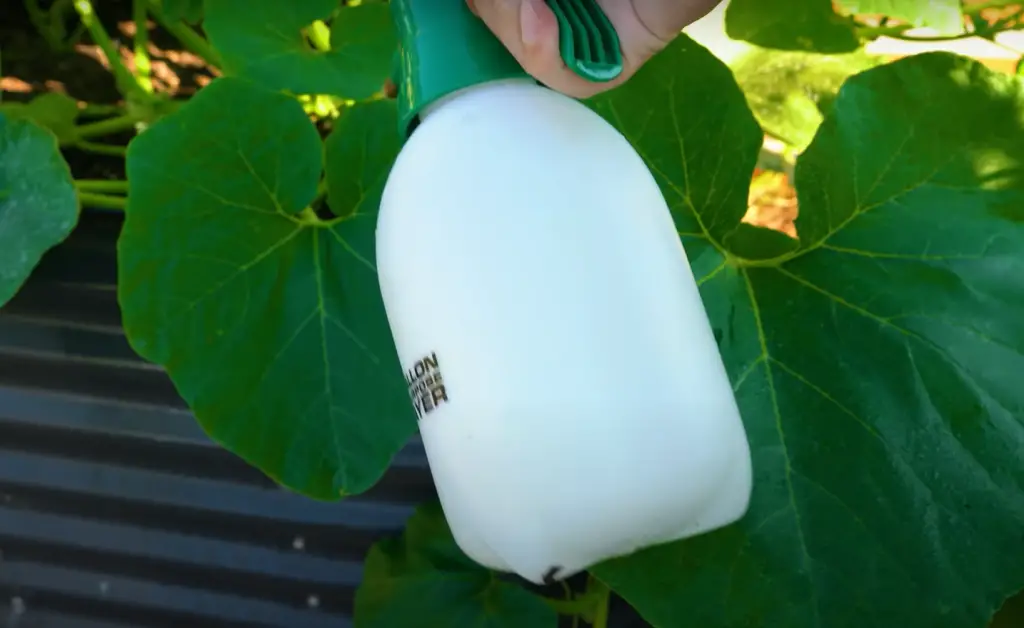
A good rule of thumb is to use 1 gallon (3.8 liters) of water for every 100 square feet (9.3 m2) of plant coverage. For example, if you are treating an area that is 200 square feet (18.6 m2), you should use 2 gallons (7.6 liters) of water in your garden sprayer.
Mix 2 tablespoons of neem oil per gallon of water.
Once your garden sprayer is filled with the appropriate amount of water, add 2 tablespoons (30 ml) of neem oil for every gallon (3.8 liters) of water in the sprayer. If you are using a concentrated form of neem oil, mix 1 teaspoon (5 ml) per gallon (3.8 liters).
Mix 1 tablespoon of organic liquid soap per gallon of water.
In addition to the neem oil, add 1 tablespoon (15 ml) of organic liquid soap for every gallon (3.8 liters) of water in your garden sprayer. The organic liquid soap will help the neem oil stick to the leaves and give it more time to work its magic on pests. Again, make sure to thoroughly mix the organic liquid soap into the water before spraying it onto your plants.
Shake well, then pressurize the sprayer and begin spraying.
Once you have added the neem oil and organic liquid soap to your garden sprayer, give it a good shake to mix everything together. Then pressurize the sprayer according to the instructions on the packaging, point the nozzle towards your plants, and begin spraying.
Spray onto both sides of plant leaves.
Once everything is well mixed, you’re ready to start spraying! Aim for both sides of the plant’s leaves and be sure to evenly coat them so that all parts of each leaf are treated with the mixture. Allow enough time for each side of the leaf to dry before spraying again.
Repeat applications as needed.
Once you’ve finished spraying all of your plants, allow the mixture to sit on them for several hours before rinsing it off with water. You may need to repeat this process multiple times to effectively eliminate pests and protect your plants from future infestations. For best results, continue applying the neem oil mixture every 3-4 weeks until you no longer have a pest problem.
Store leftover solution in a cool, dark place.
Any leftover solution that is not used should be stored in a cool, dark place and disposed of after several months if not used as per the manufacturer’s instructions.
Which Plants Should You NOT Use Neem Oil On?
Arugula
Arugula is a delicate, leafy green vegetable and should not be treated with neem oil. Neem oil can cause damage to the plant’s foliage and interfere with its growth. Therefore, it is best to avoid using neem oil on arugula.
Basil
Basil is another delicate plant that should not be treated with neem oil.
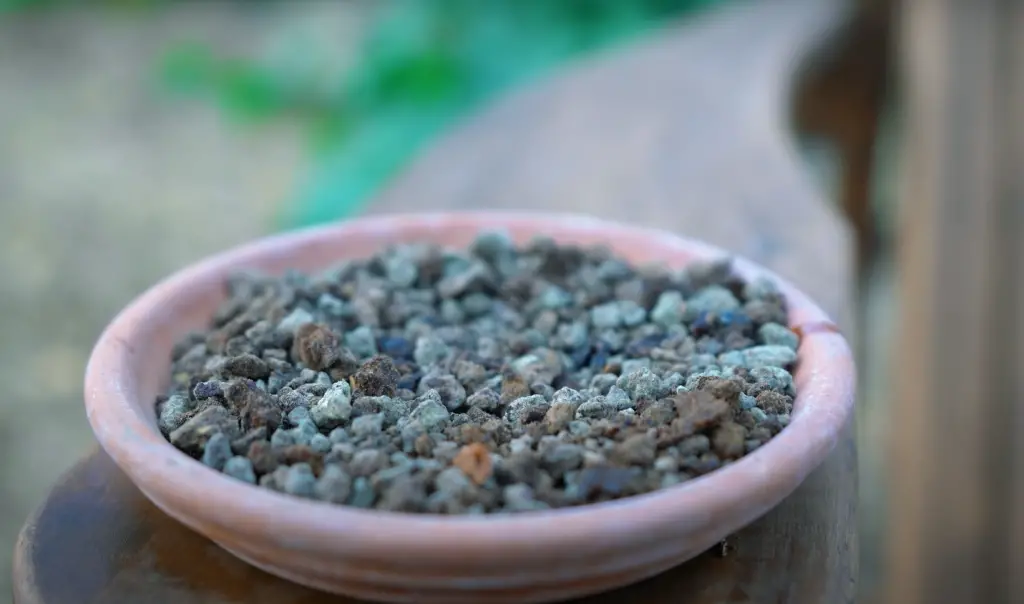
Neem oil can damage and even kill the plant, so it is best to avoid using it on basil.
Cucumbers
Cucumbers are a sensitive crop and should not be treated with neem oil due to their potential impact on the plant’s growth. Neem oil can cause leaf burn or discoloration, reducing yields and stunting the growth of cucumber plants. Therefore, it is best to avoid using neem oil on cucumbers. You should better use natural pesticides such as insecticidal soaps and horticultural oils instead.
Tomatoes
Tomatoes are also sensitive to neem oil and should not be treated with it. Neem oil can damage the plant’s foliage, leading to leaf burn or discoloration. This can reduce yields and stunt the growth of tomato plants. Therefore, it is best to avoid using neem oil on tomatoes, as well as other vegetables in the same family such as peppers and eggplants. Natural pest control methods are recommended for these types of crops.
Trees
Neem oil should not be used on some trees either as it can cause damage to the foliage and interfere with their natural growth and development. For example, you should not use neem oil on fruit trees such as apples, pears, and peaches. You should also avoid using it on conifers like pines and firs. Natural pest control methods are recommended for these types of trees.
Lettuce
Lettuce is a delicate crop and should not be treated with neem oil. Neem oil can damage the plant’s foliage, leading to leaf burn or discoloration. Additionally, neem oil can interfere with the plant’s growth, reducing yields and stunting the growth of lettuce plants. Therefore, it is best to avoid using neem oil on lettuce. You should better use natural pest control methods instead.
Sage
Sage is a delicate herb and should not be treated with neem oil. This plant can be damaged or killed if exposed to an excessive amount of neem oil.
For example, you could use a garlic spray to get rid of pests on your sage plants.Roses
Roses are very sensitive to neem oil and should not be treated with it.
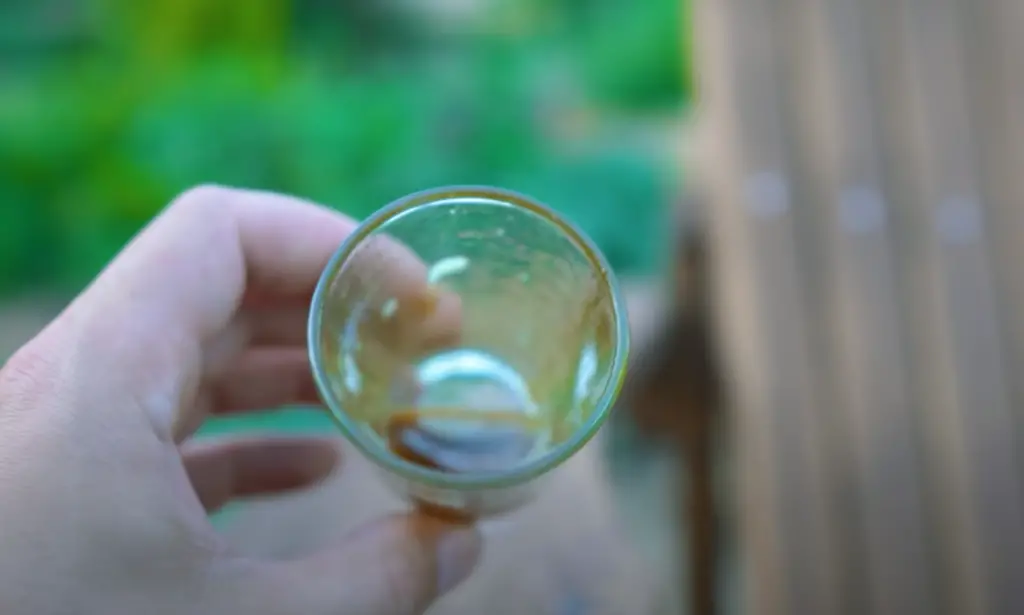
Roses can be treated with other natural pest control methods. For example, insecticidal soaps, horticultural oils, and even homemade remedies such as garlic sprays or chili pepper sprays can be used to get rid of pests on rose plants [3].
FAQ
Is neem oil safe on all plants?
No, neem oil is not safe on all plants. While it can be beneficial to some, it can cause damage or death to other plants. It is best to research the species of your plant before spraying it with neem oil. Additionally, neem oil should always be applied following the instructions on the label and in a well-ventilated area. If you notice any adverse effects after its use, stop treatment and contact your local extension office for further advice. Neem oil should never be ingested and should always be kept away from pets and children. If you are unsure whether or not your plant is safe for neem oil treatment, contact an expert for assistance.
When should you not use neem oil?
Neem oil should not be used in temperatures above 90 degrees Fahrenheit or in direct sunlight, as this can cause burning of the leaves. Additionally, neem oil should not be applied to recently transplanted plants or stressed plants. Neem oil should also not be applied more than once every three weeks, and never within two days of a predicted rain shower. Finally, neem oil should never be used on any edible plants that may come into contact with skin, like tomatoes and peppers. Before using neem oil, always check the label for specific instructions and cautions regarding plant species and application conditions. It is best to consult an expert if you are still unsure about the use of neem oil.
Is neem oil safe to use around pets and children?
Neem oil should always be kept away from pets and children, as it can irritate when ingested or inhaled. Additionally, neem oil should not be used on any edible plants that may come into contact with skin, like tomatoes and peppers. If you are unsure whether or not your plant is safe for neem oil treatment, contact an expert for assistance. It is best to keep small children and animals away from treated areas until the product has completely dried. If you suspect your pet or child has been exposed to neem oil, seek medical advice immediately.
Can I mix neem oil with other products?
It is not recommended to mix neem oil with some products as it may cause an adverse reaction. Neem oil should not be mixed with any other pesticide, fungicide, or insecticide products. Additionally, neem oil should never be mixed with detergents or hard soaps, as these can reduce the effectiveness of the oil. Before mixing any product with neem oil, always check the label for instructions and cautions regarding use. If you are unsure whether or not your mix is safe, contact an expert for assistance.
What type of application method works best for neem oil?
The most effective way to apply neem oil is via a spray bottle or through soil drenching; however, some plants may require direct contact applications. It is best to consult an expert to determine the best application method for your specific plant. Always check the label on the neem oil product for instructions regarding use and make sure to follow all safety precautions.
What are some alternatives to using neem oil?
Some other methods of pest control include introducing beneficial insects such as ladybugs, lacewings, and predatory mites; handpicking pests off plants; using row covers or poly-spun fabric over crops; encouraging natural predators in the environment (e.g., birds); trapping; and removing weeds or diseased areas before they spread further. Using compost tea can also help naturally prevent
Are there any side effects associated with using neem oil?
In general, using neem oil is considered safe when used correctly according to product instructions.
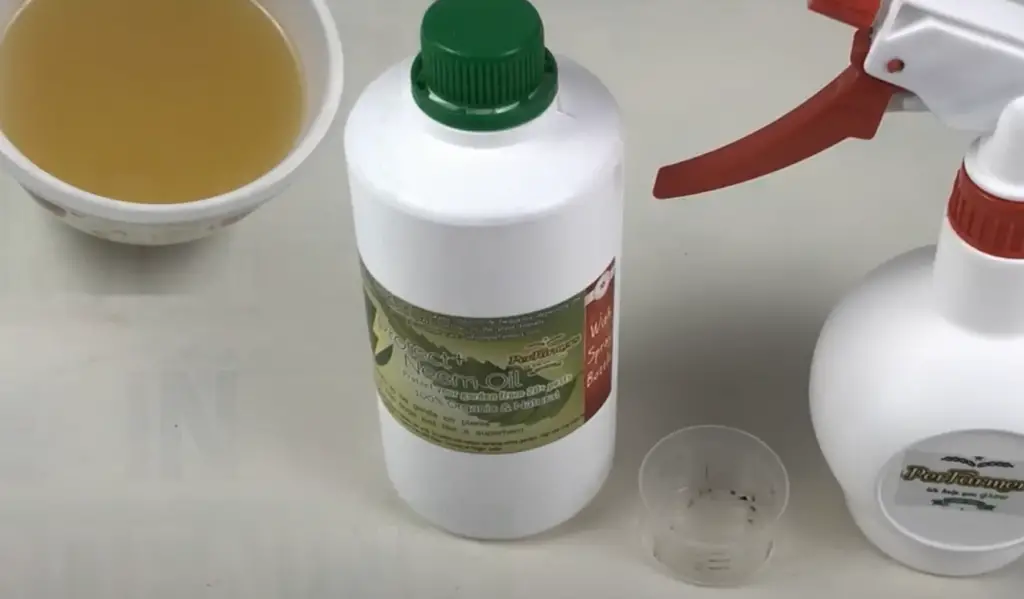
However, if exposure occurs through ingestion or inhalation of large amounts of misted neem oil, it can cause nausea, vomiting, and diarrhea in humans and pets. Additionally, some people may be allergic to neem oil and it should not be used directly on the skin or taken internally. If you have any concerns about using neem oil, contact an expert for advice before proceeding.
Can you use neem oil on potatoes?
Potatoes should not be treated with neem oil, as it can potentially cause burning of the leaves. Additionally, neem oil should not be used on any edible plants that may come into contact with skin, like tomatoes and peppers. If you are unsure whether or not your plant is safe for neem oil treatment, contact an expert for assistance. It is best to keep small children and animals away from treated areas until the product has completely dried. Finally, always check the label on the neem oil product for instructions regarding use and make sure to follow all safety precautions.
Can I eat vegetables sprayed with neem oil?
No, you should not eat vegetables sprayed with neem oil. Neem oil is a natural pesticide and fungicide that can be toxic when ingested in large quantities. Additionally, neem oil should not be used on any edible plants that may come into contact with skin, like tomatoes and peppers. If you are unsure whether or not your plant is safe for neem oil treatment, contact an expert for assistance. It is best to keep small children and animals away from treated areas until the product has completely dried.
How often can you use neem oil on vegetables?
Neem oil can be used once a month on vegetables as long as it is not applied within two weeks of harvesting. Additionally, neem oil should not be used on any edible plants that may come into contact with skin, like tomatoes and peppers. If you are unsure whether or not your plant is safe for neem oil treatment, contact an expert for assistance. It is best to keep small children and animals away from treated areas until the product has completely dried.
Can I use neem oil on fruit trees?
Yes, you can use neem oil on fruit trees as long as it is done correctly and you follow the instructions on the product label. Before applying neem oil, make sure to check for any pests or diseases that may be present. Additionally, it is important to note that neem oil should never be applied during hot weather or when temperatures are above 90°F (32°C).
How to use neem oil on fruit trees?
When using neem oil on fruit trees, it is important to read and follow the instructions carefully. Generally, you will need to mix a solution of neem oil with water in a spray bottle or garden sprayer and apply it directly to the foliage of the tree. Be sure to cover all areas completely and repeat treatment every two weeks until pests are under control.
How to maintain fruit trees after using neem oil?
After using neem oil on fruit trees, it is important to maintain the health of the tree by providing adequate water and nutrients. Additionally, you should monitor for any new pests or diseases and apply additional treatments as needed. Also, consider adding other natural pests control methods such as handpicking pests off of the leaves and branches; introducing natural predators in the environment (e.g., birds); trapping; and removing weeds or diseased areas before they spread further. Using compost tea can also help naturally prevent pests and diseases from taking hold in your plants.
Why do you need to contact an expert before using neem oil?
It is important to consult with an expert before using neem oil because it can potentially cause the burning of the leaves of some plants and be toxic when ingested in large quantities. Additionally, different plants have different needs and tolerances for insecticides and fungicides, so it is best to get advice from a professional about what products are safe for your particular plant.
Why keep small children and animals away from treated areas until the product has completely dried?
It is important to keep small children and animals away from treated areas until the product has completely dried because neem oil can be toxic if ingested.
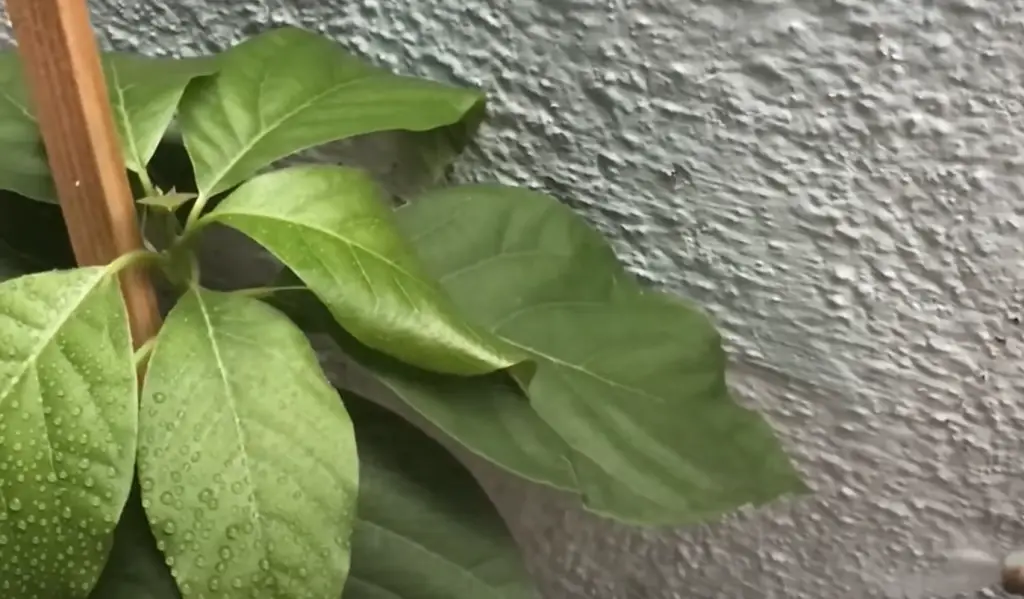
Additionally, children and pets may be more susceptible to any harmful effects of the neem oil. Therefore, it is best to take all necessary precautions when using neem oil near children or animals.
What is the best way to store neem oil?
The best way to store neem oil is in a cool, dry place away from direct sunlight and heat. Additionally, it should be stored in its original container with the lid tightly secured. The shelf life of neem oil is typically two years if stored properly.
What other natural pest control methods exist?
In addition to using neem oil, there are several other natural pest control methods available such as handpicking pests off of leaves and branches; introducing natural predators in the environment (e.g., birds); trapping; and removing weeds or diseased areas before they spread further. Compost tea can also help naturally prevent pests and diseases from taking hold in your plants.
Useful Video: How to Use Neem Oil to Control Pests & Diseases
Conclusion
Neem oil can be a useful tool for controlling pests and diseases in your garden. However, it’s important to remember that not all plants should be treated with neem oil. Several delicate crops, fruits, and vegetables, as well as trees and herbs, should not be treated with neem oil due to its potential impact on their growth and development. Therefore, it is best to avoid using neem oil on these sensitive plants and opt for more natural pest control methods instead. This will help ensure the health and well-being of your garden and the plants growing in it.
References:
- http://npic.orst.edu/factsheets/neemgen.html
- https://www.masterclass.com/articles/how-to-mix-neem-oil-for-plants-explained
- https://agrikulturetoday.com/what-plants-not-to-use-neem-oil-on/







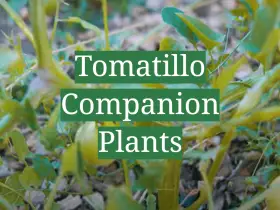
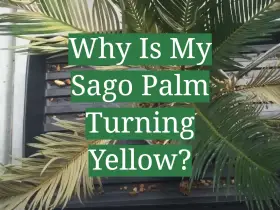
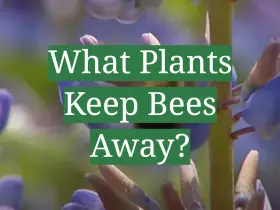
Leave a Reply
View Comments